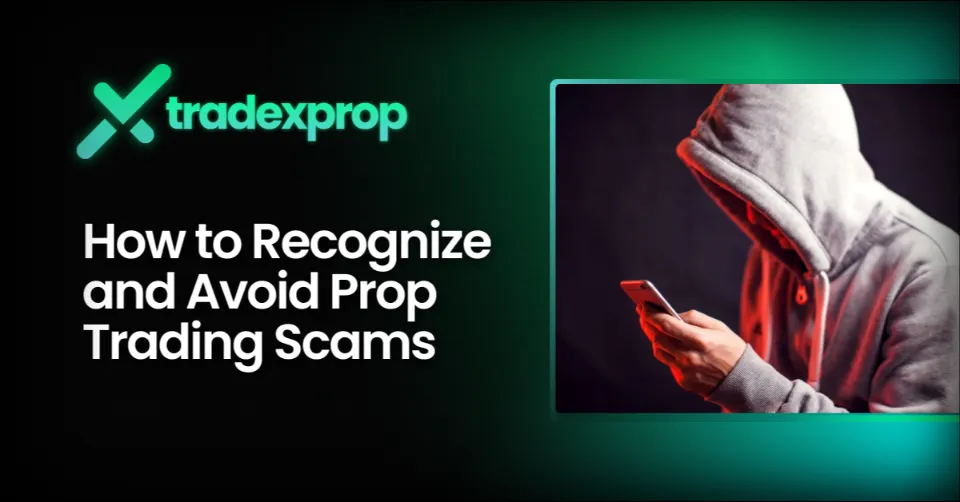How to Recognize and Avoid Prop Trading Scams
The proprietary trading industry has expanded rapidly, attracting both skilled traders and firms looking to capitalize on this demand. While legitimate prop firms provide access to capital and growth opportunities, fraudulent firms have emerged, prioritizing evaluation fees over actual trading success. According to Finance Magnates, the prop trading industry grew by over 150%, yet many traders report facing payout delays, hidden fees, and restrictive trading conditions from unregulated firms. To avoid falling victim to these scams, it’s essential to conduct thorough research and verify the legitimacy of a prop firm. To ensure reliability, join prop firms that support industry-leading platforms like cTrader, Match-Trader, MetaQuotes and DxTrade. Integration with these platforms often validates a firm’s credibility and reputation in the industry.
Understanding the common warning signs of scams is crucial for avoiding financial losses and ensuring that your trading efforts contribute to long-term success. The following sections highlight key indicators that distinguish reliable prop firms from fraudulent ones and provide actionable steps to verify their legitimacy.
Unprofessional and Poorly Maintained Websites
A firm’s website is often the first indicator of its legitimacy. Fraudulent prop firms typically have poorly designed websites that lack essential details about their policies, trading conditions, and legal disclaimers. These websites may contain grammatical errors, missing regulatory information, and vague contact details, making it difficult to verify their authenticity.
Legitimate firms invest in secure, professional websites with transparent funding models and clear trader agreements. A high-quality website should provide detailed information on evaluation processes, profit-sharing structures, and risk management policies. If a firm’s website lacks these critical elements, it may be a red flag indicating potential fraud. However, be cautious, as some scammers may also create aesthetically appealing websites to mask their fraudulent activities. Always verify the legitimacy of a firm beyond its website design.
High Upfront Deposits Without Transparency
Many fraudulent firms require traders to pay high upfront evaluation fees but provide no clear path to accessing real trading capital. These firms often generate revenue exclusively from challenge fees, rather than from actual market participation. Some traders complete evaluations only to find that live trading accounts are never assigned, or they encounter unexpected rule changes that disqualify them from receiving a funded account.
At Tradexprop, we believe in maintaining a sustainable and transparent business model. While some firms offer refunds on upfront fees, this practice can be risky for the long-term stability of a prop firm. Refunding the nominal upfront fee for challenge accounts may seem appealing, but it removes a critical income source for the firm. This could lead to an unsustainable business model, where the firm relies on new traders’ fees to cover refunds for previous traders—similar to a “money game” or Ponzi scheme.
Instead, Tradexprop focuses on building a robust ecosystem by retaining the upfront fee. This approach ensures the firm’s financial stability and allows us to provide consistent support and resources to our traders. By choosing a firm without refund policies, you’re selecting a partner with a healthier, long-term business model that prioritizes sustainability and reliability.
Evaluation Fee Structure (Tradexprop)
| Account Size | One-Step Fee | Two-Step Fee |
|---|---|---|
| 5K | $45 | $35 |
| 10K | $85 | $75 |
| 25K | $215 | $155 |
| 50K | $395 | $285 |
| 100K | $795 | $465 |
| 250K | $2,155 | $1,350 |
| 400K | $3,755 | $2,450 |
Traders should be wary of firms that charge extremely high upfront fees without offering clear refund policies or account progression guidelines. Additionally, hidden costs such as ongoing maintenance fees or undisclosed trading taxes are clear warning signs of a financially unstable firm. Instead, look for reputable companies that offer promotions and discounts to make funded accounts more affordable. Checkout our promotion or upcoming promotions through our social community like Discord, Instagram, Facebook, X and Linkedin
No Support for Live Trading Accounts & Lack of Real Human Assistance
A critical warning sign of prop trading scams is the absence of live trading accounts even after traders successfully complete their evaluations. Fraudulent firms often keep traders locked in demo environments, never transitioning them to real capital-backed accounts. These operations generate revenue primarily from challenge fees, rather than supporting actual market participation. Once interest in the firm declines and fewer traders sign up for challenges, the company often collapses, leaving traders stranded without payouts.
Beyond the lack of live trading, poor customer support is another red flag. Many scam firms rely on automated responses, generic email templates, or non-responsive chatbots, offering little to no real assistance. This leaves traders frustrated and without recourse when issues arise, whether it’s account suspensions, payout delays, or unclear trading rules. Without direct communication and real-time guidance, traders are left navigating complex challenges alone.
At Tradexprop, we take a different approach. We ensure that traders transition from demo to live trading once they successfully meet evaluation criteria, offering real capital-backed accounts with transparent funding structures. Our support system is designed to prioritize real human interaction, providing access to:
- Dedicated live chat support & email support for immediate assistance.
- Active Discord & community forums where traders can engage, ask questions, and receive updates.
- Personalized trader support from experienced professionals who understand trading challenges.
By joining a firm that values real-time human engagement, traders are not just signing up for an account—they are becoming part of a professional trading community that fosters growth, transparency, and long-term success. At Tradexprop, we believe that genuine support and clear trading pathways set the foundation for a trustworthy prop trading experience.
Unrealistic Profit Promises
Fraudulent firms often lure traders by advertising guaranteed profits and risk-free trading. They may promise high payouts with minimal effort or market exposure, which is unrealistic given the inherent risks in financial markets.
No legitimate prop firm can guarantee consistent profitability, as market conditions fluctuate and trading always carries risk. Instead, reputable firms provide structured risk management strategies, educational resources, and realistic scaling opportunities. If a company claims traders can achieve 100% returns with zero risk, it is a strong indicator of a prop trading scam.
Unclear Profit-Sharing Models
Another common issue with scam prop firms is the lack of transparency in profit-sharing structures. Some firms impose hidden withdrawal conditions, excessive profit-split requirements, or delayed payout schedules, making it difficult for traders to access their earnings.
A legitimate prop firm will have a clear and structured profit-sharing model that prioritizes fair compensation for traders. Below is an example of an industry-standard profit-sharing structure:
| Firm Type | Profit Split | Withdrawal Process |
|---|---|---|
| Scam Firm | 50-50 or lower | Delayed / Blocked |
| Legitimate Firm | 80-20 (Tradexprop) | First Payout On Demand |
| Premium Upgrade | 90-10 (Add-On) | First Payout On Demand |
If a firm does not clearly define payout terms, processing times, or profit-sharing percentages, it may be engaging in exploitative trading practices.
Conclusion: Protect Yourself from Prop Trading Scams
With the growing number of proprietary trading firms, distinguishing between legitimate and fraudulent platforms is essential. A careful examination of website quality, evaluation fees, live trading support, profit-sharing models, and realistic expectations can help traders identify trustworthy firms.
Scam firms often operate with high fees, demo-only accounts, unclear withdrawal policies, and misleading profit claims. Traders should always verify a firm’s reputation, check online reviews, and ensure that the firm provides structured funding opportunities before committing their money.
By choosing a transparent and well-structured prop firm, traders can maximize their chances of success and build a sustainable trading career without falling victim to fraudulent schemes.
For those seeking a reliable prop trading firm, Tradexprop offers a structured and transparent approach to trader funding, ensuring fair evaluations, timely payouts, and long-term trading opportunities.
FAQ for How to Recognize and Avoid Prop Trading Scams
Q1: How do I know if a prop firm is a scam?
Red flags include poor website transparency, high upfront fees with no refund policy, demo-only accounts, unclear profit-sharing models, and excessive withdrawal restrictions. Always verify a firm’s legitimacy before signing up.
Q2: Can I get a refund if I’m scammed by a prop firm?
Most fraudulent firms do not offer refunds. If you suspect a scam, report it to trading regulatory authorities and seek legal advice.
Q3: What’s the best way to find a legitimate prop firm?
Look for firms with structured evaluation models, real live trading accounts, clear payout policies, and a strong reputation in the industry. Research trader reviews and community feedback before committing.




